Sorry it's taken so long to update the blog. Coming back from El Salvador has been a lot to process and I needed time to collect my thoughts. Thanks Amber for posting about the Election. The following are excerpts from my journal about the first two days following the election.
March 17
After taking a day to recover from all the post-election festivities, we headed off to meet with one of the FMLN diputados (Congressman), Hugo Martinez. He spoke a lot about immigration reform and wanting to work closely with the U.S. on this matter. Twenty percent of El Salvador’s economy is based on remittances sent by Salvadorians in the U.S. to family still in El Salvador, so immigration is a big issue. The new administration wants to tackle the factors pushing people to migrate, but they know this will not happen over night, so they are asking the U.S. stability for people with TPS and maybe some kind of Visa that allows Salvadorians in the U.S. with TPS to freely travel between the two countries to visit family which will strengthen families ties that are severed due to immigration.
FMLN also wants to tackle the gang issues, which are plaguing the country. ARENA wasn’t very motivated to combat the gangs because they profited from the violence. Many ARENA members own private security companies (vigilantes) and weapon companies. So they profit from the violence because more people need to hire vigilantes and carry guns for protection.
Hugo Martinez stressed that El Salvador’s new government doesn’t want to be compared to other leftist countries. They are not Communist, they just want equality and to end oppression. The new government will look at leftist countries like Cuba, Venezuela, and Ecuador and note what has worked and what hasn’t worked, but ultimately will make their own decisions. The new government wants friendly relations with the U.S., but they do not want to be submissive or a puppet of the U.S. El Salvador wants to be a strong country on its own.
March 18
Today we visited the UCA. It was so good to be back on familiar grounds. Not too much had changed since I was a student there. After walking around the campus for a while, we made our way over to the UCA Chapel and Romero Center. We stop in the Chapel to say some prayers and then walked through the Romero Center looking at the pictures and revisiting the Rose Garden (a memorial to the 6 Jesuit martyrs and they’re housekeeper and her daughter). While walking through the Romero Center, we had the privilege of bumping into Dean Brackley, SJ and Jon Sobrino, SJ. Dean is very involved with the Casa program and came to El Salvador right after the 6 Jesuits were killed to help continue their mission at the UCA. Jon Sobrino was one of the UCA Jesuits during the war and would have been killed with the other 6 had he not been out of the country for a lecture. Dean welcomed us back to El Salvador and then spoke to us for a while about the elections. He then made a comment that traveling to El Salvador is like a spiritual pilgrimage. I fell like that is a beautiful way of putting what this trip to El Salvador meant to me. The country has such a strong faith based in liberation theology and so many spiritual icons like Romero, Rutilio Grande, the 4 church women, and the 6 Jesuit martyrs. Returning to El Salvador was like returning to my spiritual roots. I felt invigorated and refreshed, ready to return to the U.S. and continue working for social change and living in solidarity with the people of El Salvador.
Paz,
Stephanie
Monday, April 13, 2009
Sunday, March 29, 2009
El Pueblo Unido Jamás Será Vencido
I wrote this to be published in the Ragweed (the JVC South newsletter), and I've incorporated a few photos:
Katie, Stephanie, and I had the great privilege of traveling to El Salvador last month as International Election Observers for the presidential election on March 15th. The three of us studied abroad there during college and we were excited to have the opportunity to return. Our experiences in El Salvador had a significant impact on each of us and our understanding of and commitment to social justice.
The right-wing ARENA party in El Salvador has been in power for the last 20 years. ARENA was founded by Roberto D'Aubuisson, who also founded the death squads in El Salvador and was responsible for the assassination of Archbishop Oscar Romero. El Salvador's civil war ended with the Peace Accords in 1992, and during ARENA's time in power since the end of the war, the country has seen little improvement. There is still a huge disparity between rich and poor, the economy is extremely dependent on Salvadorans in the United States sending back remittances, and the country is wracked with violence (now from gangs rather than the military).
During the civil war, the FMLN was the organization of guerrillas fighting against the repressive government. At the end of the war, the group became a formal political party. This year the FMLN candidate, Mauricio Funes, was hugely popular in the polls leading up to the election, and we knew there was a good chance he would win, for the first time in the party's history.
We went to a few different polling places (centros de votación) on election day, and when the polls closed we were at a big polling place in the city of Santa Tecla. The voting process involved quite a few safeguards, including having representatives from both parties seated at each table that was checking IDs against lists of names, handing out the ballots, and tinting voters' fingers with ink. If one party tried to do something wrong, the other party was literally sitting next to them. We heard some reports of fraud – mainly people from outside El Salvador coming and voting with false IDs (most likely hired by ARENA) – but everything we saw went smoothly and according to the rules.
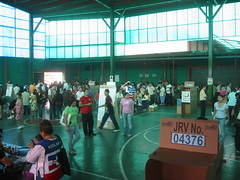
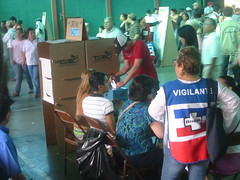
At the end of the day, the doors closed, and the vote count began. Each table had 450 ballots and a list of 450 voters. After counting the remaining ballots and comparing that number to the number of signatures of voters (thumbprints for those who could not sign their names), they sorted and counted the ballots at each table. This election was just for president and vice president, so each ballot had the flags of the two parties (only FMLN and ARENA were running), and the voter needed to draw an X on their party of choice.
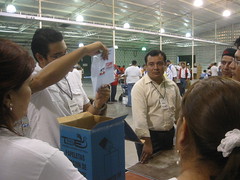
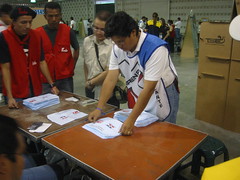
As tables began finishing their counts, we heard cheer after cheer from the FMLN. It became clear that Funes had won at our polling place. We went out into the parking lot where some staunch FMLN friends were listening to results on the radio. Reports from other locations made it clear that Funes was winning in other places as well.
For the first time in Salvadoran history, the country would have a leftist president. We took off our election observer badges (which required that we be neutral), put on FMLN t-shirts that were handed to us, and went out into the streets where people were celebrating. It was a beautiful sea of red shirts and hats and flags and so much joy. It was moving to hear the chant "El pueblo unido jamás será vencido" – the people united will never be defeated. We were with people who were forced to leave El Salvador during the war because otherwise they would have been killed, people who had fought with the guerrillas for the entire war, and people who had simply suffered greatly under the Salvadoran government. It was clear that it was a bittersweet moment for many people – great joy at an FMLN victory after all those years, but sorrow in remembering all the people who fought to achieve it but never lived to see it.
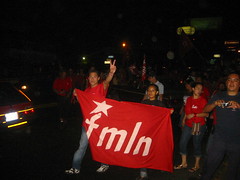
It was an honor to witness this historic event in solidarity with the people of El Salvador. While it felt like we didn't do much, multiple people expressed their appreciation of us being there and said that our solidarity was very important. After reflecting on all the pain that the United States has caused El Salvador, sending millions of dollars daily to the Salvadoran military that raped, tortured, and massacred people for organizing, speaking out, or simply being poor, the importance of solidarity from the U.S. became clearer to me. The U.S. still has a lot of power over El Salvador, and, just like during the war, our actions and decisions can have a great impact on the country, for good or for bad, which is why it is so important that we stand in solidarity with the people of El Salvador.
It is hard to tell what changes President-elect Funes will bring, and we don't really know if he will be a good president, but we do know that for once the left has been given the opportunity to make changes in the interest of the poor people of El Salvador that ARENA never did. In his acceptance speech, Funes specifically mentioned the preferential option for the poor and his desire to be a president for social justice. When I asked Salvadorans what they thought of Funes, if they thought he would do a good job, they usually just said that they hoped so. They hoped that he would bring about change that they so badly want and need.
After the election, we spent the week meeting with people; visiting places like the University of Central America (UCA), where six Jesuit priests and two women were brutally murdered in 1989 (also where we ran into liberation theologian Jon Sobrino, which almost made Katie faint in excitement), and the Cathedral where Monseñor Romero is buried; and spending time with old and new friends from our study abroad program. It was a great joy to spend this week in El Salvador, and we are very grateful to all those who gave donations and prayers to our cause.
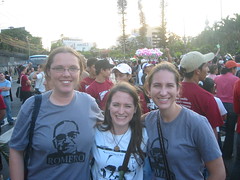
Katie, Stephanie, and I had the great privilege of traveling to El Salvador last month as International Election Observers for the presidential election on March 15th. The three of us studied abroad there during college and we were excited to have the opportunity to return. Our experiences in El Salvador had a significant impact on each of us and our understanding of and commitment to social justice.
The right-wing ARENA party in El Salvador has been in power for the last 20 years. ARENA was founded by Roberto D'Aubuisson, who also founded the death squads in El Salvador and was responsible for the assassination of Archbishop Oscar Romero. El Salvador's civil war ended with the Peace Accords in 1992, and during ARENA's time in power since the end of the war, the country has seen little improvement. There is still a huge disparity between rich and poor, the economy is extremely dependent on Salvadorans in the United States sending back remittances, and the country is wracked with violence (now from gangs rather than the military).
During the civil war, the FMLN was the organization of guerrillas fighting against the repressive government. At the end of the war, the group became a formal political party. This year the FMLN candidate, Mauricio Funes, was hugely popular in the polls leading up to the election, and we knew there was a good chance he would win, for the first time in the party's history.
We went to a few different polling places (centros de votación) on election day, and when the polls closed we were at a big polling place in the city of Santa Tecla. The voting process involved quite a few safeguards, including having representatives from both parties seated at each table that was checking IDs against lists of names, handing out the ballots, and tinting voters' fingers with ink. If one party tried to do something wrong, the other party was literally sitting next to them. We heard some reports of fraud – mainly people from outside El Salvador coming and voting with false IDs (most likely hired by ARENA) – but everything we saw went smoothly and according to the rules.


At the end of the day, the doors closed, and the vote count began. Each table had 450 ballots and a list of 450 voters. After counting the remaining ballots and comparing that number to the number of signatures of voters (thumbprints for those who could not sign their names), they sorted and counted the ballots at each table. This election was just for president and vice president, so each ballot had the flags of the two parties (only FMLN and ARENA were running), and the voter needed to draw an X on their party of choice.


As tables began finishing their counts, we heard cheer after cheer from the FMLN. It became clear that Funes had won at our polling place. We went out into the parking lot where some staunch FMLN friends were listening to results on the radio. Reports from other locations made it clear that Funes was winning in other places as well.
For the first time in Salvadoran history, the country would have a leftist president. We took off our election observer badges (which required that we be neutral), put on FMLN t-shirts that were handed to us, and went out into the streets where people were celebrating. It was a beautiful sea of red shirts and hats and flags and so much joy. It was moving to hear the chant "El pueblo unido jamás será vencido" – the people united will never be defeated. We were with people who were forced to leave El Salvador during the war because otherwise they would have been killed, people who had fought with the guerrillas for the entire war, and people who had simply suffered greatly under the Salvadoran government. It was clear that it was a bittersweet moment for many people – great joy at an FMLN victory after all those years, but sorrow in remembering all the people who fought to achieve it but never lived to see it.

It was an honor to witness this historic event in solidarity with the people of El Salvador. While it felt like we didn't do much, multiple people expressed their appreciation of us being there and said that our solidarity was very important. After reflecting on all the pain that the United States has caused El Salvador, sending millions of dollars daily to the Salvadoran military that raped, tortured, and massacred people for organizing, speaking out, or simply being poor, the importance of solidarity from the U.S. became clearer to me. The U.S. still has a lot of power over El Salvador, and, just like during the war, our actions and decisions can have a great impact on the country, for good or for bad, which is why it is so important that we stand in solidarity with the people of El Salvador.
It is hard to tell what changes President-elect Funes will bring, and we don't really know if he will be a good president, but we do know that for once the left has been given the opportunity to make changes in the interest of the poor people of El Salvador that ARENA never did. In his acceptance speech, Funes specifically mentioned the preferential option for the poor and his desire to be a president for social justice. When I asked Salvadorans what they thought of Funes, if they thought he would do a good job, they usually just said that they hoped so. They hoped that he would bring about change that they so badly want and need.
After the election, we spent the week meeting with people; visiting places like the University of Central America (UCA), where six Jesuit priests and two women were brutally murdered in 1989 (also where we ran into liberation theologian Jon Sobrino, which almost made Katie faint in excitement), and the Cathedral where Monseñor Romero is buried; and spending time with old and new friends from our study abroad program. It was a great joy to spend this week in El Salvador, and we are very grateful to all those who gave donations and prayers to our cause.

Monday, March 23, 2009
We're back!
I just wanted to write briefly to let everyone know that we returned from our El Salvador trip yesterday afternoon. We had a wonderful time, and we'll be writing reflections and posting pictures soon. For the moment, though, we have a lot of work to catch up on!
Thank you all so much for your prayers, good thoughts, and donations. We were only able to go thanks to the support of many people.
Muchisimas gracias, and keep checking the blog for more entries!
Thank you all so much for your prayers, good thoughts, and donations. We were only able to go thanks to the support of many people.
Muchisimas gracias, and keep checking the blog for more entries!
Sunday, February 22, 2009
JV El Salvador Trip
We are three Jesuit Volunteers currently serving in Houston, Texas. This March, we will have the privilege of traveling to El Salvador to act as international election observers, meet with community leaders, and learn about the social, political, and economic reality of this small Central American country. In the context of our experiences as JVs working with immigrant and refugee populations, this trip is an opportunity to walk in solidarity with the people we serve.
From 1980 to 1992 the country of El Salvador was embroiled in a brutal civil war. More than 80,000 people were killed and more than two million people were forced to flee their homeland. A negotiated peace was declared on February 1, 1992 in a lengthy peace process mediated by the United Nations. Since that time, the reconstruction of El Salvador and the implementation of the peace accords have moved forward, though often with great difficulty. In spite of the successes in the peace process, there is still a long road ahead for El Salvador. As postwar crime, violence, and poverty plague the country, the 2009 Presidential Election offers the possibility of change and hope for the future.
By serving as election observers we will be assigned to polling places to monitor the voting process and ensure that free and fair elections take place. It is our hope that our presence will deter voter fraud and intimidation at the polls so that the voices of the people can be heard. In addition to this, we will visit local communities and organizations that are working for social justice and the human rights of the people of El Salvador. By learning more about the reality of the people living in El Salvador, we hope to better understand the struggle of the immigrants in the United States with whom we work.
The three of us were lucky enough to have each spent a semester studying abroad in El Salvador, and the experience was a spiritual wake-up call and played a huge role in shaping our understanding of social justice and of living out the Gospels. Returning to that environment as Jesuit Volunteers, with a clearer understanding of how we can turn this experience and knowledge into action, will continue to broaden our global perspectives and guide us in our individual ministries.
In order to make this trip happen, we are fundraising money for the cost of travel expenses and to contribute to programs that assist the Salvadoran people. Each of us is responsible for raising $1000. We understand that times are hard, but we are asking that you consider making a donation to our group. This trip means a lot to us, and any contributions are greatly appreciated. If you do not feel able to give money, we ask for your prayers and encouraging words. Thank you very much for your support and generosity.
If you would like to donate, please contact Amber for our address. We are also looking into accepting online donations. Please stay posted! Our trip is from March 13-22, and we will be posting photos and reflections on the trip here on our blog. Thank you once again for your generosity.
From 1980 to 1992 the country of El Salvador was embroiled in a brutal civil war. More than 80,000 people were killed and more than two million people were forced to flee their homeland. A negotiated peace was declared on February 1, 1992 in a lengthy peace process mediated by the United Nations. Since that time, the reconstruction of El Salvador and the implementation of the peace accords have moved forward, though often with great difficulty. In spite of the successes in the peace process, there is still a long road ahead for El Salvador. As postwar crime, violence, and poverty plague the country, the 2009 Presidential Election offers the possibility of change and hope for the future.
By serving as election observers we will be assigned to polling places to monitor the voting process and ensure that free and fair elections take place. It is our hope that our presence will deter voter fraud and intimidation at the polls so that the voices of the people can be heard. In addition to this, we will visit local communities and organizations that are working for social justice and the human rights of the people of El Salvador. By learning more about the reality of the people living in El Salvador, we hope to better understand the struggle of the immigrants in the United States with whom we work.
The three of us were lucky enough to have each spent a semester studying abroad in El Salvador, and the experience was a spiritual wake-up call and played a huge role in shaping our understanding of social justice and of living out the Gospels. Returning to that environment as Jesuit Volunteers, with a clearer understanding of how we can turn this experience and knowledge into action, will continue to broaden our global perspectives and guide us in our individual ministries.
In order to make this trip happen, we are fundraising money for the cost of travel expenses and to contribute to programs that assist the Salvadoran people. Each of us is responsible for raising $1000. We understand that times are hard, but we are asking that you consider making a donation to our group. This trip means a lot to us, and any contributions are greatly appreciated. If you do not feel able to give money, we ask for your prayers and encouraging words. Thank you very much for your support and generosity.
If you would like to donate, please contact Amber for our address. We are also looking into accepting online donations. Please stay posted! Our trip is from March 13-22, and we will be posting photos and reflections on the trip here on our blog. Thank you once again for your generosity.
Subscribe to:
Comments (Atom)
